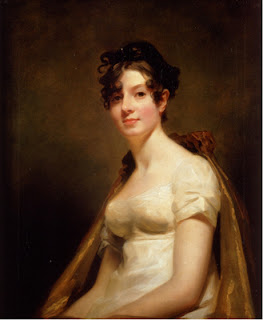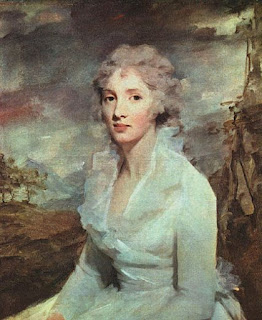Artist inspiration and artist influences. No biographies, dates or scholarly research here - this is a personal response to the work of Sir Henry Raeburn by Australian artist Fiona Morgan.
While I was living in Edinburgh I became fascinated with the stories of the
very very many inventive and creative Scots of times past from that city. You
may be amazed at just how many breakthroughs we take for granted in modern life were Scottish in origin. Sir Henry Raeburn, as a venerated citizen of Edinburgh, came to my attention.
 |
| Anne Raeburn |
It is as much Henry Raeburns' story as his paintings that catch my admiration. He was an outsider to the art establishment, who did the work necessary to become a great painter. Let me summarise:
 |
| William Robertson, Lord Robertson |
Henry Raeburn began his working life as an apprentice goldsmith. For a bit of context, his era was 1756-1823 in Edinburgh, Scotland. As part of the job he was required to paint miniature portraits, for which it turned out he had some talent. His employer introduced him to Edinburgh's leading portrait artist of the day who gave him advice and loaned him pictures to practice copying.
 |
| Colonel Alastair Ranaldson Macdonell of Glengarry |
He decided to become a portrait artist himself. To increase his skill he sought advice from the best artists in Britain and travelled to Italy to study the paintings there, as recommended. After two years of travel and study he returned to Edinburgh and established his portrait painting business, for which he built his own studio. He was successful and well regarded.
 |
| Commander Hugh Clapperton |
A bad business investment bankrupted him but did not stop him. He painted his way out of debt, recovered his fortune and ended up being knighted.
 |
| Elizabeth Campbell Marchesa di Spineto |
I love his story of perseverance, discipline, study and hard work (with a dash of entrepreneurial chutzpah) that took him from being an orphan with nothing and a complete outsider to the art establishment, to a technically accomplished and wealthy painter of portraits of high society.
 |
| Elizabeth Hamilton |
Onto his actual painting. Usually this quite old (some would say classic) style of painting bores me silly. Yes, yes, I admire and appreciate the technical ability, but the murky shadows, highly dramatised lighting, period dress and stiffness of the sitters just fails to fill me with enthusiasm.
 |
| Miss Eleanor Urquhart |
However, I do enjoy Raeburn's painting. He only painted from life, and I think it shows through in the way each sitter has a personality and a believably real pose.
 |
| Mrs R. Scott Moncrieff |
The skin of the subjects in his paintings glow with light. The portraits are of live people! And although the highly dramatised lighting does irritate me (on some days, depending on what I've had for breakfast), I appreciate that the way the light is used to focus your eye is very effective. I find the full range of light to dark contrasts makes for bold, strong work.
 |
| Reverend Robert Walker Skating on Duddingston Loch |
I enjoy the sumptuous texture of the clothing in his paintings which is just tight enough to convey the fabric. In this way that he used his brushstrokes he was ahead of his time, with a confident and masterful
square brush technique sometimes bordering on the modern bravura handling so popular today (both which enthrall me).
 |
| Sir Walter Scott |
More Sir Henry Raeburn links
http://www.nationalgalleries.org/collection/artists-a-z/R/4399/artistName/Sir%20Henry%20Raeburn
http://en.wikipedia.org/wiki/Henry_Raeburn
http://www.britsattheirbest.com/archives/002612.php
About the Creative Cauldron series of posts










No comments:
Post a Comment
Say what you like just keep it sane and polite. It's my blog and I'll delete if I want to.